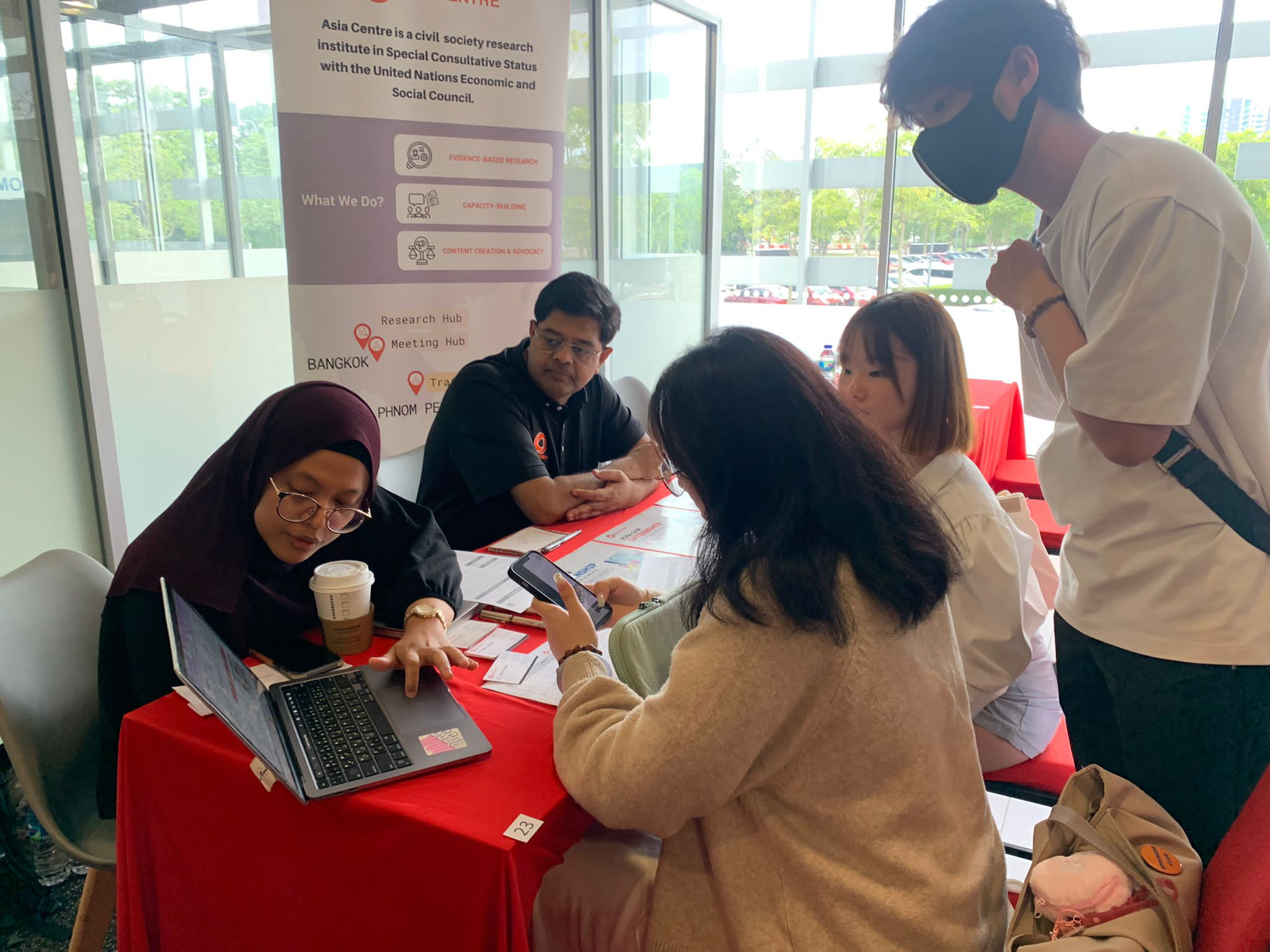
Learning how governments managed the COVID-19 is crucial for protecting civic spaces and enhancing resilience and preparedness for future emergencies in Asia. This central theme emerged from all three-panel discussions hosted by the International Center for Not-for-profit Law (ICNL) – a Tier 1 title partner – during Asia Centre’s 9th International Conference, “Shrinking Civic Space in Asia: Stories of Resistance and Pushback,” held from 21 to 23 August 202 in Bangkok, Thailand.

During her opening remarks on 22 August 2024, Julie Hunter, ICNL’s Senior Legal Advisor for Asia & the Pacific, outlined how ICNL’s contribution to the conference is aimed to reflect on the impact of the COVID-19 pandemic. She emphasised that the pandemic raised not just public health concerns, but also about the infringement of civic freedoms. As future pandemics or other public emergencies are anticipated, it is essential to review both the negative impacts and the best practices from this period. This approach will facilitate the adoption of preventative strategies to better safeguard civic freedoms moving forward.
Following the opening remarks, Julie Hunter moderated the first of the three ICNL panel discussions. Entitled, “Best Practices in Collaborative Governance of Public Emergencies”, the panel focused on pandemic best practices across Japan, New Zealand, South Korea and Taiwan, drawing on a series of reports that ICNL had published on these countries. Five speakers, including the authors of the reports, discussed effective strategies and lessons that other nations can learn to enhance governance during public emergencies while upholding civic freedoms.
Lina Salim, Programme Coordinator at the Asia Centre, and Aoi Horiuchi, Senior Advocacy Officer at the Japan NGO Center for International Cooperation (JANIC), highlighted Japan’s “soft legal strategy”, which emphasised clear communication with the public, utilising “requests” rather than strict orders, and decentralising power to local authorities. This approach fostered effective local governance and minimised the need for broad, sweeping restrictions.
Dr Bok Gyo Jeong, Associate Professor at Kean University (New Jersey, USA), emphasised that South Korea’s success in managing the pandemic while ensuring civic freedoms was primarily due to the strong collaboration between the government, the private sector and civil society. He pointed out that the creation of an enabling environment – marked by effective information-sharing and active stakeholder consultation – was key to this achievement.
In New Zealand, Dr Dean Knight, Professor of Law, Victoria University of Wellington, explained that the broad Executive authorities conferred by COVID-19 laws and policies were grounded in legislative and judicial checks & balances and, most importantly, were accountable to the country’s Bill of Rights Act. Protests during that period, for instance, were protected and actions were taken only against individuals who had abused their freedom to assemble and express.
Dr Shawn Shieh, Founder and Director of Social Innovations Advisory and Freshwater Institute, described Taiwan’s pandemic management as composed of three key aspects: information transparency; government accountability through the implementation of rights-respecting laws and effective checks & balances; and cross-sector collaboration founded in strong societal trust, notably with the civic tech community that resulted in tracking website and fact-checking institutions.

On 23 August 2024, ICNL hosted its second panel discussion titled “National Government-Run Relief Funds and Other Barriers to CSO Resourcing.” Moderated by Julia Wang, ICNL’s Legal Advisor for Asia & the Pacific, the panel brought together three panellists who addressed the critical need for more effective funding models and resource allocation for civil society organisations during public emergencies, such as the COVID-19 pandemic.
Biraj Patnaik, Executive Director of the National Foundation for India, noted that laws like India’s Foreign Contribution (Regulation) Act limited options for international resourcing for civil society organisations. In the vacuum, the government has managed relief funds and gathered resources, but this approach has proven ineffective and lacks transparency. Patnaik suggests that allowing cross-border funding for civil society organisations would enable funds to be implemented more effectively.
Jose Africa, Executive Director, IBON Foundation, noted that in a country like the Philippines, the main barrier to civil society resourcing is laws and regulations that can be invoked to ban organisations deemed threatening national security. This results in citizens being afraid of providing support, of any kind, to CSOs in the country. Therefore, an enabling legal framework is required for effective support to civil society in the region.
Kirana Anjani, Program Coordinator for Democracy and Fundamental Freedoms, ASEAN Parliamentarians for Human Rights, offered a model of a civil society trust fund in a context where civil society funds are limited through regulatory barriers. Models such as this that seek to provide resources to civil society organisations would decentralise funding from government and authorities during public health crises in the future.

Building on the discussions from the two previous panels, ICNL hosted a third panel on 23 August 2024 titled “Legacies of COVID-19 Governance and Impacts on Civic Freedoms.” Moderated by Lily Liu, ICNL’s Legal Advisor, this session featured a panel of researchers who shared critical insights into the enduring impacts of the pandemic on governance and civic freedoms.
Prashant Singh, a legal researcher based in India, noted that the role of civil society organisations issuing reports and policy recommendations to monitor governments was critical in ensuring that authorities are held accountable. Such roles must be safeguarded in future emergencies.
Meghna Sharma, another legal researcher in India, highlighted the important role of human rights documentation during the COVID-19 pandemic, which was critical in ensuring evidence-based advocacy. She noted that, in future emergencies, the focus should be put on these activities as a foundation for calls for legal reforms and government accountability.
Kirana Anjani from ASEAN Parliamentarians for Human Rights called on the civil society sector to form broad and multisectoral coalitions, where they can work together to address wide-ranging issues from public health to civic freedoms during future pandemics. This would not only strengthen civic spaces but also allow civil society activists to be able to effectively serve their roles during public emergencies.
ICNL’s participation in this conference reflects the Asia Centre’s ongoing collaboration with ICNL. Across 2023, the Asia Centre, in collaboration with ICNL, published several policy briefings assessing COVID-19 authoritarian practices across Southeast Asia, South Asia, and East Asia, and a report titled Pandemic Governance & Civic Freedoms: Best Practices from Japan (2024), which examined Japan’s approach to pandemic management as a case study.
Additionally, from 2020 to 2023, the Asia Centre was the implementing partner for the regional project “Internet Freedoms in Southeast Asia (IFSEA)”, which resulted in four country reports on internet freedoms: Cambodia, Myanmar, and Timor-Leste in 2021, and Malaysia in 2023. These reports informed policy advocacy through UN human rights mechanisms and led to national and regional capacity-building activities, as well as a strategic development meeting that brought together civil society and duty-bearers to coordinate advocacy on digital rights. In 2024, the Centre is partnering with ICNL on research into tech-facilitated gender-based violence in Cambodia, with the findings scheduled for publication later in the year.
The International Conference is Asia Centre’s annual event where it brings together its partners to share the outcomes of their programmes and network for future collaborations. Over the years, the conference has become a platform for a range of actors to meet and discuss key democracy and human rights issues.
To view the main conference article, articles on individual title partners, as well as TikTok videos and a photo album, read the main conference piece here.
If you would like to become a Conference partner for Asia Centre’s 10th International Conference “AI and Governance in Asia” or explore other collaboration opportunities, email us at contact@asiacentre.org. For more information, click here.
Asia Centre is a civil society research institute in Special Consultative Status with the United Nations Economic and Social Council. It serves as a knowledge partner and undertakes evidence-based research as well as provides capacity-building training for end beneficiaries. If you would like to collaborate with the Centre, please send an expression of interest to contact@asiacentre.org.
Follow Asia Centre’s social media channels for more information.




